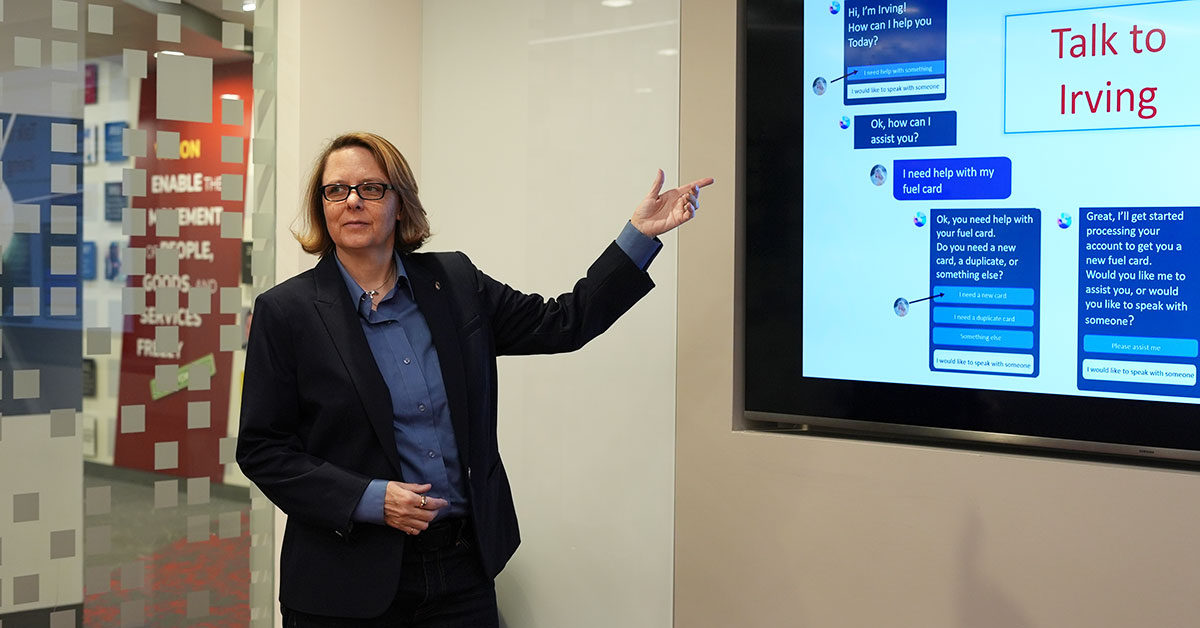If you are deciding between an academic PhD or a Doctor of Business Administration (DBA) degree, you may be interested in Dr. Suzannah Hicks’ experience. A professional data analyst and AI strategist, Suzannah recently earned her Doctor of Business Administration (DBA) degree through Johnson & Wales College of Professional Studies. She reflects on why she chose the DBA option and how writing and defending her dissertation has helped shape her career.
Why did you choose to earn a Doctor of Business Administration (DBA) degree?
Achieving this terminal degree has been a personal and professional goal all of my life.

I wanted a doctoral degree to support my goal of becoming an executive-level organizational leader. I was employed as a Data Strategist and Scientist for a not-for-profit organization dedicated to global information privacy. Recognizing that making data-driven decisions would benefit the organization, I worked hard to get leadership to buy into building a data team. The ideas I was formulating about data culture would later become a central focus of my dissertation.
I compared doctoral (PhD) degrees in data science with Doctor of Business Administration programs. Both are scholarly degrees; however, research in a PhD program emphasizes theoretical knowledge, while a DBA is geared toward applied research that I knew would support my goal to lead organizations in implementing innovative data and AI solutions. JWU’s DBA program, which has a concentration in Organizational Development, would be a powerful addition to my existing education and experience.
The JWU’s online DBA program was the perfect choice for me.
Working full-time, I needed a remote learning program, so I could complete assignments on my own schedule. JWU CPS’ curriculum made that possible because it is structured to deliver one course at a time in seven-week long classes. Every class in the DBA program offered practical information and guidance that I was consistently able to apply in my work. I was able to stay focused on both work and school, and ended the program with a dissertation I think is valuable and useful to the business environment.
How did you define your topic or problem for the dissertation?
Early in my DBA program I had planned to research the intersection between data privacy, marketing and business operations. I decided not to pursue that topic and chose instead to focus my dissertation topic on organizational data culture and how to drive its adoption.
Once I declared my topic, I used every class to advance my research for the dissertation. I tailored the final projects in each class to relate to building an organizational data culture. This strategy served me well — I was ahead when it came time to write my literature review, because I had already been researching the topic.
You accepted a new position while in the DBA program. How did changing jobs affect your dissertation?
During January 2024, six months before I was expecting to defend my dissertation, I accepted a full-time position as an AI Strategist, at Merchants Fleet. I believe that working toward my doctorate helped me get the job. Merchants Fleet was looking for a thought-leader, with expertise in the data and AI area, who could generate innovative ideas in preference to another engineer or technologist. They took a chance on me and fortunately, it has been an exceptional experience — one that is aligned with my career aspirations as a leader and strategist.
Originally my new organization was not a subject of my research; however, they agreed to become the subject after I changed my approach to data collection. Measuring an organization’s ‘culture’ is difficult. A highlight of my dissertation and defense was the methodology I developed by combining two previously unrelated survey instruments — one that measured an organization’s data analytics maturity and a second one that measured the decision-making style of the organization.
While the methodology needs to be repeated in other environments and be peer reviewed, the results suggest that the combined survey gives a valid — even powerful — measurement of data culture.
How did you prepare for your defense?
Most programs I had considered before enrolling in JWU’s online DBA program offered little academic support — students were on their own to research and write their dissertation. JWU follows a lock-step dissertation model that guides students through the dissertation process of defining, researching, writing and defending their thesis.
My primary advisor, Dr. Julie Bilodeau, was instrumental in helping me develop a successful dissertation. She provided support and feedback at every step. Dr. Larry Hughes, my methodologist, challenged my approach and my conclusions, which helped me produce better research and stronger results. My second reader, Dr. Eglen, provided ‘fresh eye’ perspective, which was extremely valuable.
As part of my preparation, I attended fellow students’ defenses, which helped me know what to expect. I also built up to the dissertation defense by first making academic presentations and by speaking at the Big Data Days virtual conference, hosted by Enterprise Big Data Framework.
When the time came to defend my dissertation, I felt thoroughly prepared to present the problem, why it was important in the business world and how my solutions could be implemented.
What was the dissertation defense process like?
Two weeks after completing numerous revisions and with the approval of my primary advisor, I defended my dissertation. Accustomed to making presentations remotely, I was comfortable defending the dissertation on Zoom.
Three members of my committee — my primary advisor, methodologist and second reader — attended with the Program Chair. I was allowed to invite students to join and view the defense, but they were not permitted to interact or ask questions.
The presentation of my dissertation lasted about 35 minutes, followed by questions from the committee about methodology. They asked how I reached a particular conclusion and how I might do things differently. Some of the questions were easy to answer, while many challenged me to defend my work.
The three committee members left the Zoom meeting and met together to discuss my defense. I felt anxious knowing there was no guarantee that the committee would decide to pass me. While we waited for 25 long minutes, the department chair and my guests were invited to ask questions or interact with me or each other.
When my committee returned, they informed me I had passed with revisions, a common result of three possible outcomes — pass, pass with revisions or fail. Pass with revisions means there were areas I needed to revise and clarify. I was asked to develop one insight I had gained to provide stronger evidence for my conclusions, as well as other more minor edits.
Going back and forth to make additional revisions heightened my frustration and anxiety. Waiting for feedback between revisions, while there was nothing to do, was more difficult for me than anything I faced while writing my dissertation. However, I appreciate that the process has strengthened my methodology and research results.
How did you implement your findings in your work setting?
Following the committee’s acceptance of my dissertation, I presented my findings to the Executive Team at Merchants Fleet. My company had been my research subject, so many of the findings relate directly to the organization and the work we do. Merchants has been enthusiastic about implementing a number of my suggestions, based on the research findings, which will create a stronger data culture, mature our data and analytics initiatives and improve our data work.
I’ve already made several professional presentations, as well as being interviewed about my dissertation topic on two podcasts. Through my workplace, I have been interviewed for two webinars and a trade journal for the fleet management industry. I’ve been told to expect more opportunities.
How did earning the DBA contribute to your long-term career goals?
Beyond achieving my life-long dream of earning a terminal degree, the DBA degree aligns with my career path as a data analyst and AI specialist. Currently I’m at the director level and a subject matter expert. The knowledge I’ve gained in the DBA program will help me advance to the executive level—possibly to vice president or further.
How did it feel to complete your defense and successfully earn your degree?
I remember smiling as I wrapped up my defense. Throughout my life l had been striving for success without knowing what success meant for me. Ultimately my dissertation and defense were successful because I knew my material and felt confident in my ability to discuss my research approach, methodology and findings and to answer questions. It didn’t matter that earning my doctorate was later in life than I had expected; it is never too late to achieve success.
JWU’s online DBA program
The online Doctor of Business Administration (DBA) program at Johnson & Wales has been recognized by Forbes Advisor as one of the 10 Best Online DBA Programs of 2024. The DBA degree program prepares graduates to become executive level leaders, innovators, consultants, educators and policymakers. For more information about DBA program at Johnson & Wales College of Professional Studies, complete the Request Info form, call 855-JWU-1881, or email [email protected].
